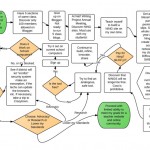My daughter wakes up with pink-eye. I’m going to be really honest here.
My first thoughts are: How sick is she? Can I give her allergy eyedrops and send her to school?
Because my second thoughts are: What are my classes doing today?
Which means that really, my first thoughts are: What are my classes doing today?
Is it a day where we are in the lab or library? If so, I can’t be absent. Subs can’t take kids to the lab or library, for good reason.
Is it a day when I need to lecture about the historical context for the reading we’ll be doing next? If so, I can’t be absent. There is no time to locate a good reading, and there is no place to copy it first thing in the morning.
Is it a day when students are having small group discussions? Forget it, I can’t be absent. If you have to ask why, you’ve never taught teenagers.
Is it a day for student presentations? I can’t be absent. Even if I had time to watch a video of presentations, do you think I’m leaving a video camera with a substitute teacher? If you do, then you weren’t around the time I left an iPod so that students could listen to an audio book when I was absent. Despite the note I left, the sub left it in my unlocked room, and it was stolen.
So. When can I be absent? I can’t.
If I am, which I realize I must be on this day, I have to redesign the day. I am compelled to leave something that fits into what we’re learning, but it must require little to no coaching from me. Tricky.
Really, I can’t rely on coaching or instructions from anyone. Today, I need to write out the instructions for my students on a half-sheet of paper so that I don’t have to guess whether my sub will put them on the board. Why a half-sheet? So I can sneak enough printouts from the laser printer down the hall. There is nowhere to make quick copies. So, shh! Don’t tell, okay?
And I’d better get moving; it is now 6:30 a.m.; class starts at 8, my son needs his lunch made and my daughter needs decongestant. I call the sub coordinator, a lovely and efficient woman, and get on the laptop.
But here’s the maddening question lurking behind my efforts to redesign the day. Why can’t I rely on a substitute to do anything? I had to be out for four days earlier this fall. I lovingly prepared what I thought were challenging but clear activities, and organized everything neatly. I wrote all the classes’ agendas on the whiteboards for each day. I was at school until 8:30 the night before I left. I had reviewed the ground rules with my students.
When I returned, little was done according to plan. Classes’ work was not separated out, many students had not turned in their work, and there was absolutely no written feedback for me on the classes’ overall behavior during the week, although I had specifically asked for feedback.
I always take what students say about subs with a hefty pinch of salt. Many said the sub didn’t say anything to them the whole time– 95 minute block periods. One class reported that he told them “You know what to do.” I would have normally thought this was an exaggeration of a substitute’s personal detachment from what must seem like a great tide of teen complacency, but no. All the evidence pointed to the idea that the sub had basically handed out the handouts, and sat at the desk. This is not an unusual experience, at least for many high school teachers.
The least he could have done was review with students what was due that day. They’re kids. Maybe give them reminders about how much time was left? Circulate? See if he could be of help?
But here’s the part that makes me even more sad than taking the following week to re-teach most of the material: If, according to the system, I am replaceable by the person who subbed for me over those four days, what does that say about my value to the system? That sub could have stood in for any of us. Shouldn’t students, parents and teachers be able to expect that a teacher stepping into my classroom has a basic level of commitment and competence?
The students know this game, of course, after many years at it. Usually, I just sigh and move on.
On the day in question, I haul my children along with me to organize the sub plans. I chastize my daughter not to touch anything. When I meet my sub, Dolores, I know she is good. She introduces herself to my harried self with a handshake, a look in the eye. Even though I am there at my desk, she gets up and takes attendance right away. She notes late students. She moves around the room. She calmly, firmly tells the students she is their teacher for the day.
When I return, all is where I asked for it. Students e-mailed me with questions about the work I left for them… which shows they actually read the directions. She left me notes about how each class went. I would like to hug that substitute teacher. Thank you, Dolores, wherever you are!
If teachers are seen as professionals, there should be some kind of standard for substitutes. They should be observed and evaluated. Also, I should not have to drag my daughter with pink-eye into a school in order to keep her out of school. Someone should be available to make a few emergency copies. But these are not resources schools have. I am not even asked for feedback on subs, probably because nobody has time to deal with the feedback. By the time I say I don’t want a certain sub in my classroom again, it’s too late.
High standards for substitutes would help show that schools value the work we do when we create lessons for our absences, and value our students’ time and learning.








